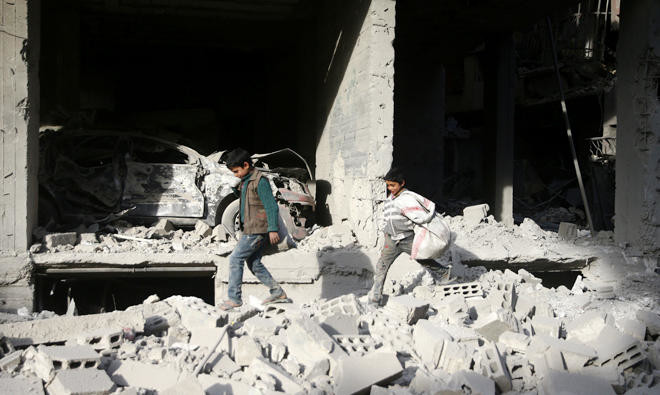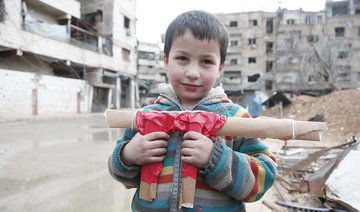BEIRUT: The airstrike hit Syria’s Eastern Ghouta on Wednesday, three days into a massive bombardment. Soon afterward, rescuers pulled four children from the building, but their father was killed and they were now orphans.
A neighbor, Mohammed Abu Anas, helped to dig through the rubble and then ran for medical aid through battered alleyways with one of the children bleeding in his arms.
“There is fear and anguish among people here, there are hundreds of martyrs and injured,” he said.
The little boy dug from the rubble, blood trickling from cuts on his face, survived the attack. His sister, also alive, was slung over the shoulder of a rescue worker, her face and headscarf white from dust. Two other siblings also survived.
Their Santiha family had already been torn apart by bombing. Two years ago, the children’s mother was killed in their home in Jobar, a district where Eastern Ghouta meets Damascus.
Wednesday’s airstrike killed their father, Majid Santiha, and his body was carried away on a stretcher. Their uncle came to the medical center where they and the body of their father were taken. He will now raise them.
Nearly 400,000 people live under siege in Eastern Ghouta according to the UN, the danger from bombs compounded by shortages of food and medicine.
“We’ve barely eaten since yesterday. I ate rotten food. There are no goods left in the shops. We bought two small tins of cheese and we got seven flat rounds of bread today,” said Bilal Issa, 25.
The food is shared with his mother, his wife and his three siblings.
When the rockets started to fall right outside his home, Issa and his neighbors started to dig through the basement of their building to create a shelter.
They lifted the floor tiles to excavate a hole with spades in which grown men can now stand upright, pulling out the earth with buckets.
The airstrikes cause massive plumes of smoke that hang over the neighborhood. The sound of warplanes fills the sky.
“Whoever leaves his house or leaves the shelter can be considered dead,” said Issa.
Death is not always immediate. Omran Madani was injured by a barrel bomb that fell outside the family home in the village of Madira on Tuesday, said his father, who identified himself only as Abu Omran.
Omran died on Wednesday. His small body lay on a hospital bed wrapped neatly in a white shroud from neck to feet and his father cradled the boy’s motionless face in his hands.
He railed against Assad, the rebel groups who control Eastern Ghouta and the leaders of foreign countries involved in the war. “May they find their children dead and taste oppression,” he said. “May God take our revenge.”
Families broken by the carnage of Ghouta’s bombs
Families broken by the carnage of Ghouta’s bombs

Some gaps have narrowed in elusive Gaza ceasefire deal, sides say

- Palestinian official familiar with the talks said some sticking points had been resolved
- But identity of some of Palestinian prisoners to be released by Israel in return for hostages yet to be agreed
A fresh bid by mediators Egypt, Qatar and the United States to end the fighting and release Israeli and foreign hostages has gained momentum this month, though no breakthrough has yet been reported.
A Palestinian official familiar with the talks said while some sticking points had been resolved, the identity of some of the Palestinian prisoners to be released by Israel in return for hostages had yet to be agreed, along with the precise deployment of Israeli troops in Gaza.
His remarks corresponded with comments by the Israeli diaspora minister, Amichai Chikli, who said both issues were still being negotiated. Nonetheless, he said, the sides were far closer to reaching agreement than they have been for months.
“This ceasefire can last six months or it can last 10 years, it depends on the dynamics that will form on the ground,” Chikli told Israel’s Kan radio. Much hinged on what powers would be running and rehabilitating Gaza once fighting stopped, he said.
The duration of the ceasefire has been a fundamental sticking point throughout several rounds of failed negotiations. Hamas wants an end to the war, while Israel wants an end to Hamas’ rule of Gaza first.
“The issue of ending the war completely hasn’t yet been resolved,” said the Palestinian official.
Israeli minister Zeev Elkin, a member of Prime Minister Benjamin Netanyahu’s security cabinet, told Israel’s Army Radio that the aim was to find an agreed framework that would resolve that difference during a second stage of the ceasefire deal.
Chikli said the first stage would be a humanitarian phase that will last 42 days and include a hostage release.
HOSPITAL
The war was triggered by Hamas’ Oct. 7, 2023 attack on southern Israel, in which 1,200 people were killed and 251 taken hostage to Gaza, according to Israeli tallies.
Israel’s campaign against Hamas in Gaza has since killed more than 45,200 Palestinians, according to health officials in the Hamas-run enclave. Most of the population of 2.3 million has been displaced and much of Gaza is in ruins.
At least 11 Palestinians were killed in Israeli strikes on Monday, medics said.
One of Gaza’s few still partially functioning hospitals, on its northern edge, an area under intense Israeli military pressure for nearly three months, sought urgent help after being hit by Israeli fire.
“We are facing a continuous daily threat,” said Hussam Abu Safiya, director of the Kamal Adwan Hospital. “The bombing continues from all directions, affecting the building, the departments, and the staff.”
The Israeli military did not immediately comment. On Sunday it said it was supplying fuel and food to the hospital and helping evacuate some patients and staff to safer areas.
Palestinians accuse Israel of seeking to permanently depopulate northern Gaza to create a buffer zone, which Israel denies.
Israel says its operation around the three communities on the northern edge of the Gaza Strip — Beit Lahiya, Beit Hanoun and Jabalia — is targeting Hamas militants.
On Monday, the United Nations’ aid chief, Tom Fletcher, said Israeli forces had hampered efforts to deliver much needed aid in northern Gaza.
“North Gaza has been under a near-total siege for more than two months, raising the specter of famine,” he said. “South Gaza is extremely overcrowded, creating horrific living conditions and even greater humanitarian needs as winter sets in.”
Palestinians in Jenin observe a general strike

- The Palestinian Authority exercises limited authority in population centers in the West Bank
JENIN: Palestinians in the volatile northern West Bank town of Jenin are observing a general strike called by militant groups to protest a rare crackdown by Palestinian security forces.
An Associated Press reporter in Jenin heard gunfire and explosions, apparently from clashes between militants and Palestinian security forces. It was not immediately clear if anyone was killed or wounded. There was no sign of Israeli troops in the area.
Shops were closed in the city on Monday, the day after militants killed a member of the Palestinian security forces and wounded two others.
Militant groups called for a general strike across the territory, accusing the security forces of trying to disarm them in support of Israel’s half-century occupation of the territory.
The Western-backed Palestinian Authority is internationally recognized but deeply unpopular among Palestinians, in part because it cooperates with Israel on security matters. Israel accuses the authority of incitement and of failing to act against armed groups.
The Palestinian Authority blamed Sunday’s attack on “outlaws.” It says it is committed to maintaining law and order but will not police the occupation.
The Palestinian Authority exercises limited authority in population centers in the West Bank. Israel captured the territory in the 1967 Mideast War, and the Palestinians want it to form the main part of their future state.
Israel’s current government is opposed to Palestinian statehood and says it will maintain open-ended security control over the territory. Violence has soared in the West Bank following Hamas’ Oct. 7, 2023 attack out of Gaza, which ignited the war there.
Qatari minister arrives in Damascus on first Qatar Airways flight since Assad’s fall

DUBAI: Qatar’s minister of state for foreign affairs arrived in Damascus on Monday on the first Qatar Airways flight to the Syrian capital since the fall of President Bashar Assad two weeks ago, Doha’s foreign ministry said.
Qatar’s foreign ministry spokesperson said Mohammed Al-Khulaifi was the most senior official of the Gulf Arab state to visit Syria since militants toppled the Assad family’s 54-year-long rule.
Iran foreign ministry affirms support for Syria’s sovereignty

- Assad fled Syria earlier this month as rebel forces led by the Sunni Islamist group Hayat Tahrir Al-Sham (HTS) entered the capital Damascus
TEHRAN: Iran affirmed its support for Syria’s sovereignty on Monday, and said the country should not become “a haven for terrorism” after the fall of president Bashar Assad, a longtime Tehran ally.
“Our principled position on Syria is very clear: preserving the sovereignty and integrity of Syria and for the people of Syria to decide on its future without destructive foreign interference,” foreign ministry spokesman Esmaeil Baqaei said in a weekly press briefing.
He added that the country should not “become a haven for terrorism,” saying such an outcome would have “repercussions” for countries in the region.
Assad fled Syria earlier this month as rebel forces led by the Sunni Islamist group Hayat Tahrir Al-Sham (HTS) entered the capital Damascus after a lightning offensive.
The takeover by HTS — proscribed as a terrorist organization by many governments including the United States — has sparked concern, though the group has in recent years sought to moderate its image.
Headed by Ahmed Al-Sharaa, Syria’s new leader and an ardent opponent of Iran, the group has spoken out against the Islamic republic’s influence in Syria under Assad.
Tehran helped prop up Assad during Syria’s long civil war, providing him with military advisers.
During Monday’s press briefing, Baqaei said Iran had “no direct contact” with Syria’s new rulers.
Sharaa has received a host of foreign delegations since coming to power.
He met on Sunday with Turkish foreign minister Hakan Fidan, and on Monday with Jordan’s top diplomat Ayman Safadi.
On Friday, the United States’ top diplomat for the Middle East Barbara Leaf held a meeting with Sharaa, later saying she expected Syria would completely end any role for Iran in its affairs.
A handful of European delegations have also visited in recent days.
Regional powerhouse Saudi Arabia, which has long supported Syria’s opposition, is expected to send a delegation soon, according to Syria’s ambassador in Riyadh.
Iran says ‘no direct contact’ with Syria rulers

- Foreign ministry spokesman: ‘We have no direct contact with the ruling authority in Syria’
TEHRAN: Iran said Monday it had “no direct contact” with Syria’s new rulers after the fall of president Bashar Assad, a longtime Tehran ally.
“We have no direct contact with the ruling authority in Syria,” foreign ministry spokesman Esmaeil Baqaei said at a weekly press briefing.














